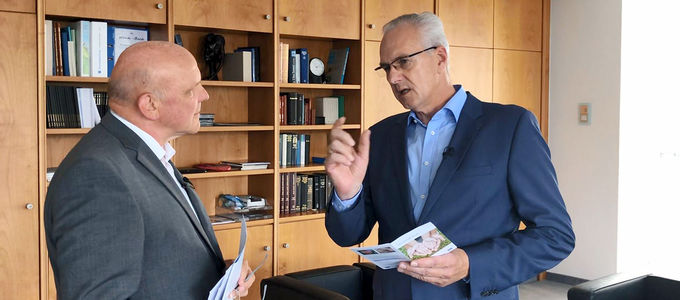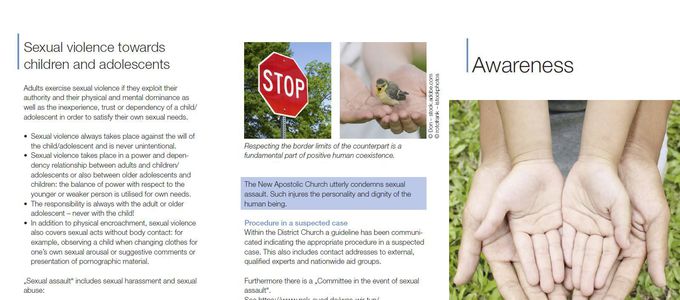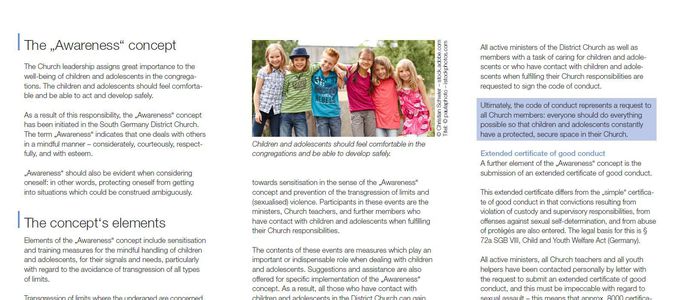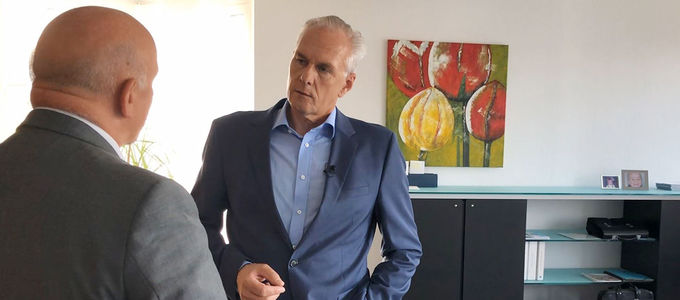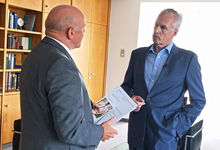Preventing violence and sexual assault
It is a burning social issue, and it doesn’t stop at the doors of the church either. Nevertheless, everyone is to know that the New Apostolic church condemns violence and sexual assault in the strongest possible terms. Such actions are violations of human personality and dignity.
It is certainly of benefit to do as much as possible in order to prevent violent or abusive incidents, which often have lifelong or even life-threatening consequences. After all, any case of abuse is one case too many! This is something on which everyone can agree. “Awareness” is the name of the concept that the New Apostolic Church of Southern Germany has developed over the last few years. This term is intended to clearly define the form that our interactions with other people should take: we are to be attentive, considerate, and respectful of others. And it is also important for each and every individual to be mindful and have the necessary “awareness” in order to avoid getting into situations that might be misinterpreted!
An overall concept comprised of many individual parts
So much for the theory. How does this concept look in practice? The leader of the New Apostolic Church of Southern Germany, District Apostle Michael Ehrich, has established some firm guidelines on the subject. He and a work group that was established some years ago have combined various documents and other elements into a single overarching concept: the package is comprised of a parent letter, a day-long workshop that incorporates a theatre piece to illustrate the topic, as well as a code of conduct, a procedural guide in the event it must be assumed that abuse has indeed occurred, a so-called “extended certificate of good conduct” for ministers, teachers, and youth leaders, training events for trainers and moderators for regular district events, and much more. And no one should assume that this is an easy subject!
A topic of great importance
In the spring session of the international District Apostle Meeting in Goslar, District Apostle Ehrich gave his brothers some profound insights into the individual modules of the concept, and shared a wealth of details with respect to the experiences to date. Appeals and flyers alone will not suffice. It is all about inspiring a fundamentally new mindset and creating an awareness for how to interact respectfully with children and youth. This requires comprehensive and regular instruction, he said. Ministers, teachers, and all functionaries in the Church districts and congregations who have any contact with children or youth in their church duties—all of these are part of the target group for a kind of thinking, a framework of action, which has now existed in the District Church for over ten years—and is constantly evolving.
Voluntary commitment and a certificate of good conduct
For one thing, this includes signing a voluntary commitment, namely the code of conduct. By way of this document, all ministers, teachers, youth leaders, choir leaders, and orchestra leaders declare that they agree to conduct themselves in a responsible way in accordance with the concept, and to confront boundary violations, sexual abuse, and violence in all forms.
As of 2016, the District Apostle, Apostles, Bishops, district rectors and congregational rectors—as well as their representatives—have also had to submit an extended certificate of good conduct (ECGC). And as of 2017, once the first round of events had been concluded in the Church districts, all active ministers, teachers, and youth leaders were likewise gradually required to submit an ECGC. New ministers now need to submit this certificate in association with their first ordination, and new teachers and youth leaders must likewise present it upon commencing their activity.
An “extended” certificate of good conduct differs from the “normal” certificate of conduct in that it also registers convictions for violations of duty of care and supervision, offenses against sexual self-determination, and mistreatment of wards. Some 8,000 of these certificates have been collected so far. And new ones are constantly pouring in. For privacy reasons, they are not submitted to the Church, but are collected by an external lawyer, who then reviews them for any entries pertaining to the Child and Youth Welfare Act. If there is any entry pertaining to sexual assault, he informs only the District Apostle. The latter sees to it that the person concerned no longer performs any duties in the Church in which he/she may have contact with children or young people. The District Apostle reserves the right to take further action.
And what if something still happens?
But what needs to be done if an incident nevertheless occurs, despite all these preventative measures? After all, one thing is clear to those responsible: it is not only a matter of prevention, but at times, unfortunately, also of intervention—namely swift and appropriate action following an incident. To this end, all the congregations have a guideline for the worst case scenario: it describes in detail the steps that are to be taken in the event of suspected sexual abuse of children or young people—from monitoring to reporting to the youth welfare office to filing a police report. The guide also contains contact information for qualified external specialists and regional aid organisations. Beyond that, the Church also has its own internal Committee for Cases of Sexual Assault.
The website of the New Apostolic Church has also delved into this topic, and shares further insights and experiences.
District Apostle Michael Ehrich agreed to an exhaustive interview with nac.today in front of the camera in order to explain this subject in the appropriate depth. We will report on the interview in this magazine.


